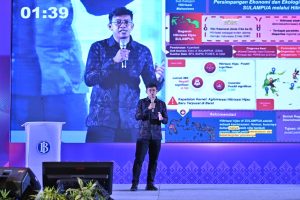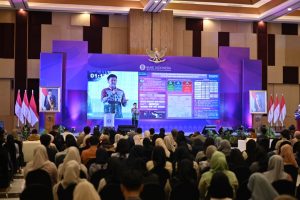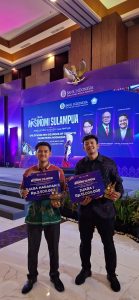Two students earned distinguished achievements at the Call for Paper – 3rd Aksinomi Sulampua 2025, an annual scientific forum organized by the Bank Indonesia Representative Office for South Sulawesi. This event serves as a platform for academics, researchers, and practitioners to present innovative ideas supporting accelerated economic development in the Sulawesi, Maluku, and Papua (SULAMPUA) regions.
Under the theme “Unlocking New Sources of Growth in Eastern Indonesia,” the competition involved a rigorous evaluation process, including initial screening, expert review of full papers, and a final presentation and awarding ceremony held on 11 November 2025. Submissions were assessed based on scientific rigor, relevance to regional issues, and their potential to contribute to sustainable development in Eastern Indonesia.


Dede Yoga Paramartha earned First Place with a paper exploring the potential of green downstreaming supported by comprehensive resource mapping. His work examines how downstreaming efforts can be directed toward environmentally conscious and inclusive growth by integrating economic and ecological perspectives. The study identifies potential centers for new green downstreaming activities using kernel analysis of recycling facility distribution and the density of micro-industries, offering a spatially informed foundation for future policy development. This approach highlights regions best positioned to support inclusive green growth within SULAMPUA.
Meanwhile, Khusnudin Tri Subhi was awarded Second Runner-Up for his research titled “Blue Economy Roadmap for SULAMPUA: Fuzzy Gustafson–Kessel Clustering Strategy and Empirical Study for Inclusive Growth Acceleration.” His study develops a data-driven roadmap for advancing the blue economy by identifying maritime potential clusters and formulating targeted strategies to promote inclusive regional economic growth.
These achievements underscore the students’ strong commitment to producing research-based solutions for regional development challenges and reaffirm the vital role of academia in supporting Indonesia’s long-term development agenda and the vision of Indonesia Emas 2045.

